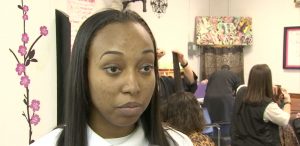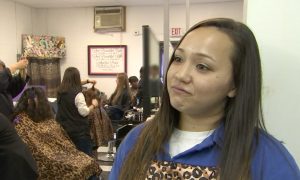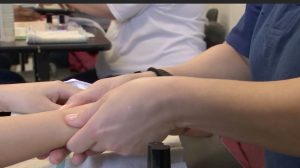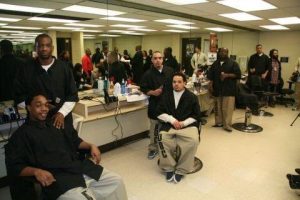Program simplifies career path for prison barber school graduates
By Jean Lotus Staff Reporter — April 20, 2016Cutting hair can be a path to a second chance, believes Larry Roberts Jr.
Roberts, 43, is Chicago’s proprietor of Larry’s Barber College locations and works as a barber instructor in Cook County Jail.
“People are so quick to talk about how bad these inmates are, but many of them are really great people,” Roberts said.
Searching for a good job — or any job — is the most difficult transition ex-offenders face when they are released or paroled.
“That’s why the recidivism is so high,” Roberts said. “They were in there for drugs or gang-banging or [misusing] credit cards and when they get out they end up doing what they know,” he said.
To break the cycle?
“Give them a trade while they are in jail,” Roberts said.
Changes announced last week make it easier for Illinois inmates who have earned their barber or cosmetology degree in prison or jail to begin working when they are released. The Illinois Dept. of Corrections and a state licensing agency have streamlined the license process to start earlier.
“This means [barber or cosmetology graduates] can begin the process of self-sustainment immediately upon release,” said Bryan A. Schneider, secretary of the Illinois Department of Financial and Professional Regulation secretary, which issues barber and cosmetology licenses.

: LaDonna Rice at Logan Correctional Center cosmetology school. (Courtesy: Illinois Department of Corrections)
The new agreement allows students in these programs to apply for their license up to six months ahead of their parole or release. That’s an improvement from before, where a license could be delayed, leaving a gap in employability for former inmates said IDFPR Spokesman Terry Horstman.
“You were looking at a two-month delay on our side of things, before these individuals were able to begin practicing their trade they got schooling for,” Horstman said.
There are five IDOC prisons with barber and cosmetology schools, according to IDOC. The first classes of about 20-25 graduated in November of last year.
Students at Logan Correctional Center in Lincoln made a video about the cosmetology program.
“We learn manicures and pedicures and it’s six hours away from being in prison,” said inmate Megan Royer, of Palatine. “We’re really like a family in here and we learned how to work together as a group.”

Megan Royer at Local Correctional Center cosmetology school. (Courtesy: Illinois Department of Corrections)
“It gives me a second chance at a future, achieving my goals,” said LaDonna Rice, of Evanston. “If you have a [criminal] background, you’re limited to jobs.”
To graduate from a barber or cosmetology program takes about nine months, or 1,500 class hours.
Roberts said some inmates finish his program during the time they’re in jail, and even continue for an instructor’s degree. Others are released before they finish the course.
“I own three barber colleges on the outside. If they don’t finish on the inside, I give them scholarships on the outside,” Roberts said.
Cook County Jail, run by Sheriff Tom Dart’s office, is not part of IDOC.
In the jail program, the inmates are allowed to use shears, and screwdrivers to change blades on their clippers.
“The only thing they can’t use is a straight razor,” Roberts said. “They use a special razor made for jail.”

Inmates learn how to give manicures at the Logan Correctional Center cosmetology school. (Courtesy: Illinois Department of Corrections
Roberts estimated he’s graduated between 50-60 inmates in the six years he’s worked at the jail. Roberts said he tells his students that barbering and cosmetology can earn good money if they are experienced and have their own clients.
“There is no limit,” he said.
Employment after a prison sentence is a little bit easier when a barber or cosmetologist is independently renting a booth in a salon, he said.
“Most of the time no one needs to know you were in jail, unless you say something.”
Learning a useful, marketable skill changes a person’s outlook, Roberts said.
“I have guys that you’d never know they’d been locked up, because that’s not who they really are,” he said. “They messed up and now they want to do right, and no one gives them a chance,” he said. “But they are really, really, really good people.“
— Program simplifies career path for prison barber school graduates —




